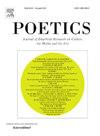Culture as configurations of categories: Analyzing peer effects via dual-to-regression modeling
IF 2
2区 社会学
0 LITERATURE
引用次数: 0
Abstract
In this paper we reimagine linear regression modeling as a relational method for cultural analysis. Drawing on the dual-to-regression analytic approach (Schoon, Melamed & Breiger, 2024), we argue that the fundamental building blocks in a regression equation are not single variables, but configurations of variables manifested by clusters of cases. In a study of peer effects and achievement in an academic institution, we show how the regression model itself may be understood as positing a network of pairwise influence relations among social actors that produces the outcome as modeled by the regression. Moreover, this network is appropriate for studying homophily (the tendency for individuals with similar characteristics to have social network connections). We push the new, case-oriented thinking about the regression model of Schoon et al. by incorporating information on networks of social relations connecting the cases. We find that, when profile similarity boosts academic performance, high-density social network clusters are discovered. We demonstrate that it is sometimes useful to consider configurations of cases as the “variables” in a regression model. We argue that this methodological innovation has a distinctive pragmatic value and strong theoretical motivation in the specific empirical context of our study, and beyond.
文化作为类别的配置:通过双回归模型分析同伴效应
在本文中,我们重新设想线性回归模型作为文化分析的关系方法。借鉴双回归分析方法(Schoon, Melamed &;Breiger, 2024),我们认为回归方程的基本组成部分不是单个变量,而是由案例集群表现出来的变量配置。在一项关于学术机构同伴效应和成就的研究中,我们展示了回归模型本身如何被理解为假设社会行为者之间的成对影响关系网络,该网络产生回归模型所模拟的结果。此外,这个网络适合研究同质性(具有相似特征的个体具有社会网络连接的趋势)。我们通过整合连接案例的社会关系网络的信息,推动了Schoon等人的回归模型的新的、以案例为导向的思考。我们发现,当个人资料的相似性提高学习成绩时,高密度的社会网络集群被发现。我们证明,有时将情况的配置视为回归模型中的“变量”是有用的。我们认为,在我们研究的具体经验背景下,这种方法创新具有独特的实用价值和强大的理论动机。
本文章由计算机程序翻译,如有差异,请以英文原文为准。
求助全文
约1分钟内获得全文
求助全文
来源期刊

Poetics
Multiple-
CiteScore
4.00
自引率
16.00%
发文量
77
期刊介绍:
Poetics is an interdisciplinary journal of theoretical and empirical research on culture, the media and the arts. Particularly welcome are papers that make an original contribution to the major disciplines - sociology, psychology, media and communication studies, and economics - within which promising lines of research on culture, media and the arts have been developed.
 求助内容:
求助内容: 应助结果提醒方式:
应助结果提醒方式:


